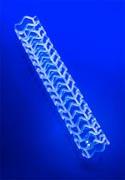
June 3, 2010 – Six-month data from the first 45 patients enrolled in the second stage of a trial for a bioresorbable stent demonstrated strong results. Abbott's bioresorbable vascular scaffold (BVS) showed a low (4.4 percent) rate of major adverse cardiac events (MACE) and no blood clots.
The results of the ABSORB trial were presented last week during the late-breaking clinical trials session at EuroPCR in Paris.
The BVS also demonstrated an in-stent late loss rate of 0.19 mm. Late loss is a measure of vessel renarrowing and looks at the change in the diameter inside the device between the time immediately following scaffold placement and at six months. The amount of renarrowing tells physicians how effective a scaffold procedure was at keeping the blood vessel open.
"With each new data milestone, Abbott's revolutionary BVS technology is one step closer to becoming a reality. The device achieved a six-month late loss rate of 0.19 mm. This finding suggests that the BVS may have the potential to treat a blocked vessel as effectively as a metallic drug eluting stent, with the added potential benefit of not leaving a permanent implant behind after the vessel is healed," said Patrick W. Serruys, M.D., Ph.D., professor of interventional cardiology at the Thoraxcentre, Erasmus University Hospital, Rotterdam, the Netherlands. He is the principal investigator for the ABSORB trial. "These extraordinary findings signal that Abbott's disappearing scaffold may become the new standard of care for treating coronary artery disease."
Abbott's BVS is made of polylactide, a biocompatible material that is commonly used in medical implants such as dissolving sutures. The bioresorbable technology is designed to restore blood flow by opening a clogged vessel and providing support until it is healed. Once the vessel can remain open without the extra support, the bioresorbable scaffold is designed to be slowly metabolized and eventually resorbed by the body. Since a permanent implant is not left behind, a vessel treated with a BVS ultimately may have the ability to move, flex and pulsate similar to an untreated vessel. The potential to restore these naturally occurring vessel functions, or vascular restoration, is one of the features that will make Abbott's BVS unique in the treatment of coronary artery disease.
The ABSORB Clinical Trial
The ABSORB trial is a prospective, nonrandomized (open label), two-phase study that enrolled 131 patients from Australia, Belgium, Denmark, France, the Netherlands, New Zealand, Poland and Switzerland. Key endpoints of the study include assessments of safety – MACE and treated site thrombosis rates – at 30 days; six, nine, 12 and 24 months; with additional annual clinical follow-up for up to five years, as well as an assessment of the acute performance of the bioresorbable vascular scaffold, including successful deployment of the system. Other key endpoints of the study include imaging assessments by angiography, intravascular ultrasound (IVUS), optical coherence tomography (OCT), and other state-of-the-art invasive and noninvasive imaging modalities at six, 12, 18 and 24 months. The next 56 patients in the second phase of the ABSORB trial will undergo imaging follow-up one year after their procedures, and all 101 patients in the second phase of the trial will receive follow-up imaging at two years.
Abbott's bioresorbable technology delivers everolimus, an antiproliferative drug. Everolimus is developed by Novartis Pharma AG and is licensed to Abbott by Novartis for use on its drug eluting vascular devices. Everolimus has been shown to inhibit treated site neointimal growth in the coronary vessels following vascular device implantation, due to its antiproliferative properties.
For more information: www.abbott.com


 January 05, 2026
January 05, 2026 









